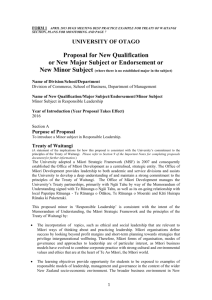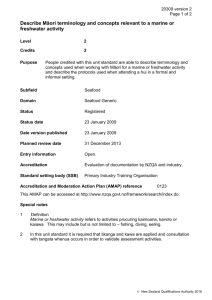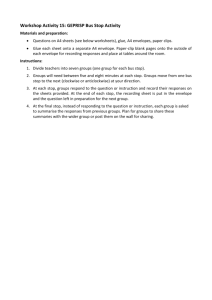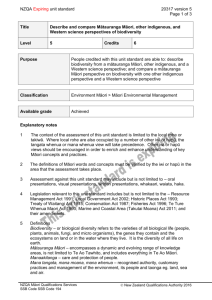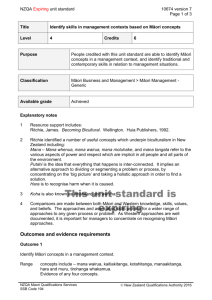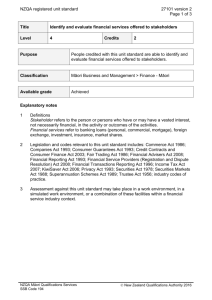20318 Explain intellectual property, international
advertisement
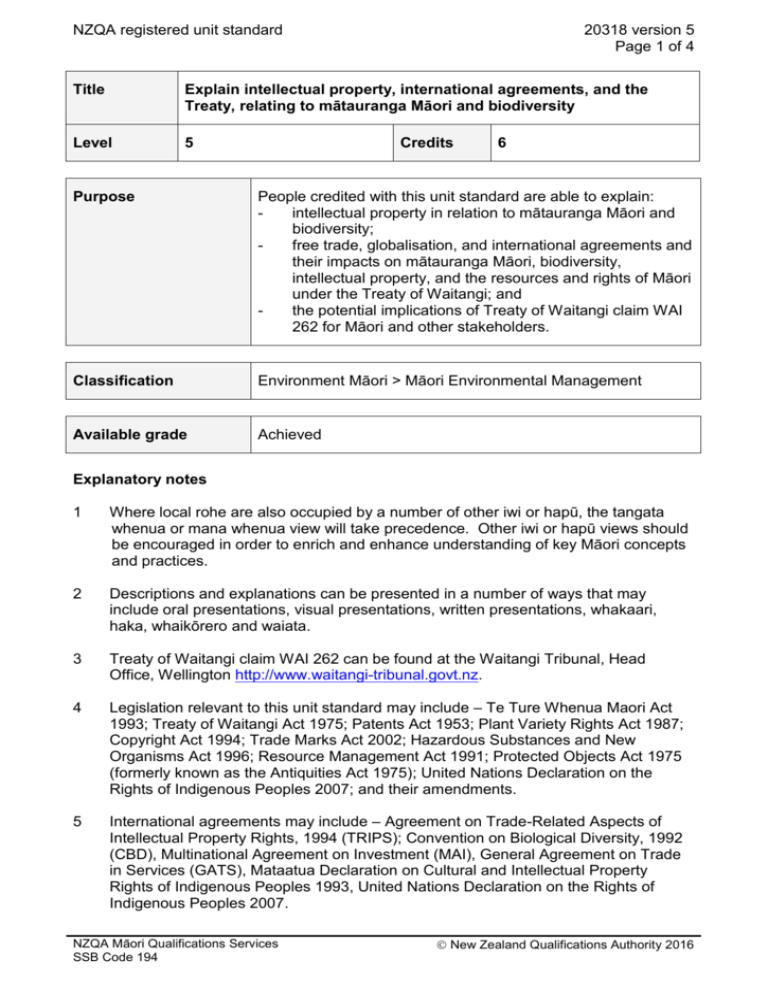
NZQA registered unit standard 20318 version 5 Page 1 of 4 Title Explain intellectual property, international agreements, and the Treaty, relating to mātauranga Māori and biodiversity Level 5 Credits 6 Purpose People credited with this unit standard are able to explain: intellectual property in relation to mātauranga Māori and biodiversity; free trade, globalisation, and international agreements and their impacts on mātauranga Māori, biodiversity, intellectual property, and the resources and rights of Māori under the Treaty of Waitangi; and the potential implications of Treaty of Waitangi claim WAI 262 for Māori and other stakeholders. Classification Environment Māori > Māori Environmental Management Available grade Achieved Explanatory notes 1 Where local rohe are also occupied by a number of other iwi or hapū, the tangata whenua or mana whenua view will take precedence. Other iwi or hapū views should be encouraged in order to enrich and enhance understanding of key Māori concepts and practices. 2 Descriptions and explanations can be presented in a number of ways that may include oral presentations, visual presentations, written presentations, whakaari, haka, whaikōrero and waiata. 3 Treaty of Waitangi claim WAI 262 can be found at the Waitangi Tribunal, Head Office, Wellington http://www.waitangi-tribunal.govt.nz. 4 Legislation relevant to this unit standard may include – Te Ture Whenua Maori Act 1993; Treaty of Waitangi Act 1975; Patents Act 1953; Plant Variety Rights Act 1987; Copyright Act 1994; Trade Marks Act 2002; Hazardous Substances and New Organisms Act 1996; Resource Management Act 1991; Protected Objects Act 1975 (formerly known as the Antiquities Act 1975); United Nations Declaration on the Rights of Indigenous Peoples 2007; and their amendments. 5 International agreements may include – Agreement on Trade-Related Aspects of Intellectual Property Rights, 1994 (TRIPS); Convention on Biological Diversity, 1992 (CBD), Multinational Agreement on Investment (MAI), General Agreement on Trade in Services (GATS), Mataatua Declaration on Cultural and Intellectual Property Rights of Indigenous Peoples 1993, United Nations Declaration on the Rights of Indigenous Peoples 2007. NZQA Māori Qualifications Services SSB Code 194 New Zealand Qualifications Authority 2016 NZQA registered unit standard 6 20318 version 5 Page 2 of 4 Definitions Biodiversity – or biological diversity refers to the varieties of all biological life (people, plants, animals, fungi, and micro organisms), the genes they contain and the ecosystems on land or in the water where they live. It is the diversity of all life on earth. Intellectual property – refers to the ownership by individuals of their creativity and innovation in the same way that they can own physical property. Mātauranga Māori – encompasses a dynamic and evolving range of knowledge areas, is not limited to Te Ao Tawhito, and includes everything in Te Ao Māori. Ngā momo wai – may include: Waiora – purest form of water, a source of well-being and life. Used for cleansing from sickness and to create positive energy. This water can become waitapu. Waimāori – water that runs freely and has no particular sacred associations. Wai horoi – water that is used to bathe in or to wash clothes. Wai inu/Wai unu – water that is used only for drinking. Drinking water is not taken from a source that is used for washing in unless there is no alternative, and then it should be taken from the stream at a specific time of the day when washing of clothes or bathing is not permitted. Waikino – water that has been corrupted or altered to such an extent that it can cause harm or water that conceals hidden danger. Waimate – water that has lost its ‘mauri’ or life force. It is “dead”, damaged or polluted with no ability to sustain life. It can contaminate other living or spiritual things. Waitai – the sea, surf or tide. Used to distinguish seawater from fresh water. Waitapu – water that has had a ‘tapu’ imposed upon it. Water that is used for special ritual practices, eg tohi and pure (baptism and purification ceremonies). Water that has a sanction (also known as a ‘rāhui’) against most everyday activities, perhaps because there has been a drowning. Outcomes and evidence requirements Outcome 1 Explain intellectual property in relation to mātauranga Māori and biodiversity. Evidence requirements 1.1 Intellectual property is explained in terms of its development and rationale in relation to biodiversity. 1.2 Intellectual property is explained in terms of its limitations for the protection of mātauranga Māori in relation to biodiversity. Range may include– art forms and cultural expression; ngā momo wai, whenua, flora and fauna; NZQA Māori Qualifications Services SSB Code 194 New Zealand Qualifications Authority 2016 NZQA registered unit standard 20318 version 5 Page 3 of 4 evidence of two is required. Outcome 2 Explain free trade, globalisation, and international agreements and their impacts on mātauranga Māori, biodiversity, intellectual property, and the resources and rights of Māori under the Treaty of Waitangi. Evidence requirements 2.1 Free trade is explained in terms of its impact on Māori, biodiversity, intellectual property, and the resources and rights of Māori under the Treaty of Waitangi. 2.2 Globalisation is explained in terms of its impact on Māori, biodiversity, intellectual property, and the resources and rights of Māori under the Treaty of Waitangi. 2.3 International agreements are explained and compared in terms of their impacts on Māori, biodiversity, intellectual property, and the resources and rights of Māori under the Treaty of Waitangi. Range evidence is required of at least two comparisons. Outcome 3 Explain the potential implications of Treaty of Waitangi claim WAI 262 for Māori and other stakeholders. Evidence requirements 3.1 Treaty of Waitangi claim WAI 262 is explained in terms of the nature of the claim, and its scope. 3.2 Treaty of Waitangi claim WAI 262 is explained in terms of its potential implications for Māori and one other stakeholder. Range other stakeholders may include – scientists, the Crown, the private sector, other indigenous peoples, the general public; potential implications may include but are not limited to – ownership; intellectual property, its use and management, who and how; responsibility; recognition; patent rights, exercise of kaitiakitanga and rangatiratanga, genetic modification; evidence of two implications is required. Planned review date NZQA Māori Qualifications Services SSB Code 194 31 December 2019 New Zealand Qualifications Authority 2016 NZQA registered unit standard 20318 version 5 Page 4 of 4 Status information and last date for assessment for superseded versions Process Version Date Last Date for Assessment Registration 1 17 December 2003 31 December 2012 Review 2 27 October 2006 31 December 2012 Rollover and Revision 3 17 September 2010 31 December 2012 Review 4 17 November 2011 31 December 2017 Review 5 19 November 2015 N/A Consent and Moderation Requirements (CMR) reference 0166 This CMR can be accessed at http://www.nzqa.govt.nz/framework/search/index.do. Please note Providers must be granted consent to assess against standards (accredited) by NZQA, before they can report credits from assessment against unit standards or deliver courses of study leading to that assessment. Industry Training Organisations must be granted consent to assess against standards by NZQA before they can register credits from assessment against unit standards. Providers and Industry Training Organisations, which have been granted consent and which are assessing against unit standards must engage with the moderation system that applies to those standards. Requirements for consent to assess and an outline of the moderation system that applies to this standard are outlined in the Consent and Moderation Requirements (CMR). The CMR also includes useful information about special requirements for organisations wishing to develop education and training programmes, such as minimum qualifications for tutors and assessors, and special resource requirements. Comments on this unit standard Please contact NZQA Māori Qualifications Services mqs@nzqa.govt.nz if you wish to suggest changes to the content of this unit standard. NZQA Māori Qualifications Services SSB Code 194 New Zealand Qualifications Authority 2016


